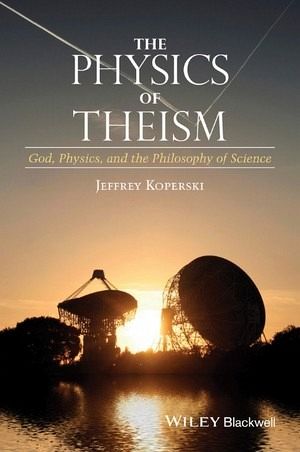Podcast: Play in new window | Download
Subscribe: Spotify | Email | RSS
Has “Science” shown that all causes are natural? Philosopher of science Dr. Jeffrey Koperski doesn’t think so. In this second part of our discussion (Part 1) he debunks five more myths about science and religion, among the topics discussed in his fascinating 2015 book The Physics of Theism: God, Physics, and the Philosophy of Science:
Philosopher of science Dr. Jeffrey Koperski doesn’t think so. In this second part of our discussion (Part 1) he debunks five more myths about science and religion, among the topics discussed in his fascinating 2015 book The Physics of Theism: God, Physics, and the Philosophy of Science:
5. Science and religion are separate realms of inquiry; science tells us what and how, and religion tells us why.
4. Science has revealed a universe without design or purpose.
3. Science by definition adheres to methodological naturalism, a commitment to explain events only in terms of natural laws and physical entities.
2. Science and religion have completely different methods: one based on evidence and the other based on authority.
1. Modern science has revealed that the cosmos is a closed system, whose causes and effects are only physical.
Links for this episode:
- Dr. Jeffrey Koperski’s home page
- The Physics of Theism: God, Physics, and the Philosophy of Science (kindle)
- Stephen J. Gould
- Robin Collins
- W.V.O. Quine
- Philip Kitcher

- Karl Popper
- Larry Laudan
- re: the demarcation problem: Science and Pseudo-Science
- naturalism
- John Locke
- “Theories of Explanation
- Epistemology of Testimony
- Interpretations of Quantum Mechanics
- Simplicity in the Philosophy of Science
- Dualism
- “causal closure” aka “The Completeness of the Physical“
- Miracles
- This week’s thinking music is “Dawn’s Battle (Instrumental)“ by Ivan Chew.


At the end of the show, Dr. Koperski rightly questioned claim of scientists universe being a closed system without any experimental evidence. But earlier in the show, he endorsed the claim of scientists that if gravitational constant was changed a bit, life would not have happened. I have looked at pains to see an experimental evidence for that, but have only found at best, conjectures made by few scientists. To me, both the claims are conjectures by scientists, unless someone can show me an experiment done to confirm that.
John Thomas,
Good point. I also caught those two statements the author made.
You’re right about “conjecture” in science. Mathematics is not Physics, and the only “theory” of gravity that scientists have is a mathematical formula. We don’t really understand the force of gravity itself. Physicists also cannot explain why “mass” is a characteristic of “matter.”
Gravity is a poorly defined “constant” in Physics. The measurements are inconsistent (even using the same instruments) and the assumption that what we measure on Earth can be applied in space (as a “constant”) doesn’t fit what we actually observe happening in space. This is why things like “black holes” and “dark matter” are arbitrarily invented by astrophysicists in order to compensate for problems with the mathematical calculations.
The evidence now suggests that we probably don’t have equations that are complex enough to really describe what is happening in space and we are attributing too many things to the force of gravity and not taking other factors into account (e.g. electrical/magnetic).
Comments are closed.